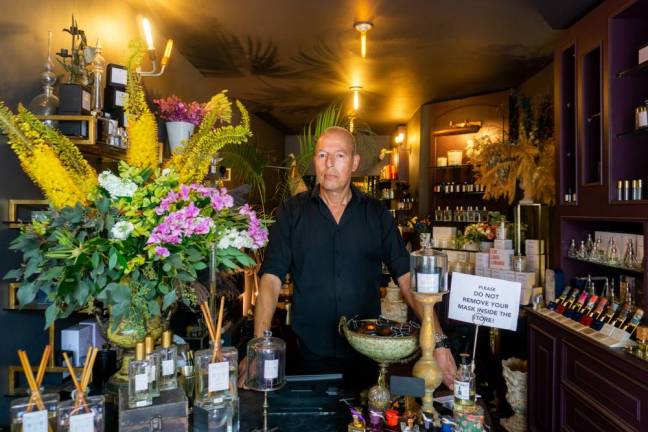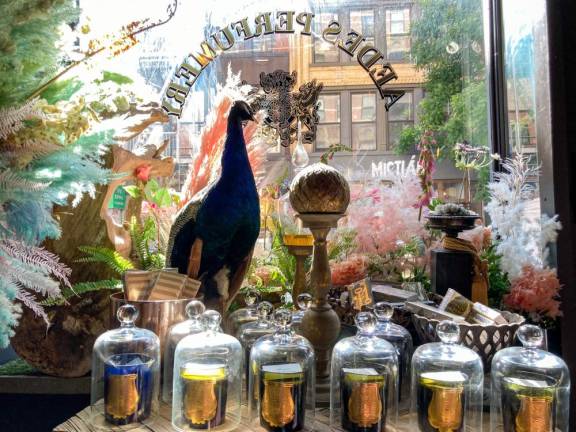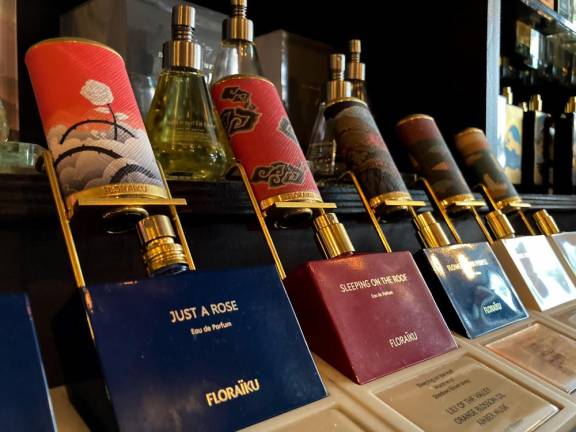The Pleasing Aroma of Aedes de Venustas
Customer loyalty, a focus on exclusivity and high-quality products helped the downtown perfumery survive COVID
The New York Times has tried many times to describe the inside of Aedes de Venustas. “Second Empire whorehouse,” “Victorian drawing room,” “darkly romantic,” “papal sumptuousness” and “jewel-box store” all approximate the somber, rich interior of the Lower East Side perfumery. It is a strange experience for customers used to sterile shelves and minimalist tables.
“Classic European,” is how Robert Gerstner described it on a balmy June afternoon. His partner Karl Bradl has spent 26 years slowly adding stuffed peacocks, trinkets, and floral displays to the store. The goal is a feeling of intimacy.
“This is such an intimate commodity you’re dealing with,” said Gerstner. “The fragrance you put on the skin, the candle you burn in the house. That is intimate. So we wanted to create an intimate environment for you to select those products.”
Aedes de Venustas, which translates to “Temple of Beauty,” does not deal in high volume or heavy foot traffic. Gerstner and Bradl buzz customers into the store. In the age of COVID, they respectfully offer only counter service, no casual browsing.
“Don’t be intimidated,” assures Gerstner. “You tell us what you like, and then we’ll start showing different fragrances.”
Fragrances and Flowers
This high-touch approach has earned them the admiration of celebrities from Steve Martin to Courtney Love. It started in September 1996, when, after a year of business, a young Bradl cold-called the offices of Vogue with a box full of fragrances and flowers.
“In September ‘96, he just prepared one of those and went to Vogue and went to the front desk and said, ‘I’d like to see the beauty director.’ And they called up and she said, ‘Sure, send him up.’”
The beauty director was Amy Astley, now the editor-in-chief of Architectural Digest. She heard Bradl out and promised to stop by the store. The next day she walked in, looked around, and promised to mention Aedes in a tiny section of the November 1996 issue. That mention caught the eye of supermodel Naomi Campbell, who appeared in the store the same month.
“I remember she came down the stairs and I was petrified,” said Gerstner. “She’s like, ‘Oh you have my eye drops!’ She looks around and she’s like, ‘Do you do corporate gifts?’ And we’re like, ‘Sure, we do now!’”
Two hours later they had a list of gifts for the biggest names in the fashion world. Twenty-two years later they were fulfilling orders from fashion houses and celebrities. The business grew out of a Christopher Street basement into a storefront, then around the corner onto Greenwich Avenue. High-profile clients rubbed elbows with casual shoppers, leading to strange moments.
Gerstner recalls one particularly funny incident, “It was a crazy busy Sunday and Sarah Jessica Parker happened to be there to pick up a couple of things for us and there were people in the store. And she was like, ‘Do you need help?’”
Parker, who was at the height of her “Sex and the City” fame, ended up recommending candles to customers who could not believe that Carrie Bradshaw was there, in person, serving as a temporary saleswoman.
Move Downtown
It was too much. Too much traffic. Too much selection. Too much of everything. Aedes had started as the sole importer of unusual European brands. It was meant to be a highly personal service, helping customers find the particular scent that worked best for them. The business was overexposed.
“A lot of our private clients just didn’t want to go into this location anymore,” said Gerstner. “Plus the Village has changed. Plus a lot of the brands we originally put on the spot, they too were purchased. So we looked at all of this and were like, ‘You know what? We can’t continue like this.’”
The shop moved. In 2018 the peacocks, candles, flowers, and perfumes migrated east from bustling Greenwich Avenue to a sleepy corner of Orchard Street. The shelves were cleared. Aedes would rededicate itself to high-quality products and high-end clientele. And just in time.
“That restructuring three years ago set us up to get through the pandemic,” said Gerstner. “Overheads, rents, restructuring the brands, all of these things really really helped us.”
Loyalty is how Aedes survived COVID. Twenty-five years of deep relationships with clients meant that people were calling them up to check in. And a focus on exclusivity and high-quality products meant business merely shifted from in-person to online.
“In a very brutal way it cleansed the market,” said Gerstner. “People want to find exclusive things, not something you can literally buy on every corner, but something you really have to make an effort to get.”
Long after leaving the dark, lush interior of Aedes Perfumery the scent lingers. Stronger and more sensual than a smartphone picture, it clings to the skin, calling to mind something costly, valuable, and elegant.
“Restructuring three years ago set us up to get through the pandemic. Overheads, rents, restructuring the brands, all of these things really really helped us.” Robert Gerstner of Aedes de Venustas


